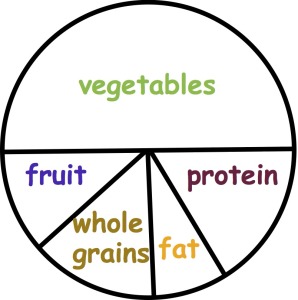Achieving a healthy weight prior to trying to conceive is not only going to help you get pregnant, but it is also going to help you have a healthy pregnancy. Women who are overweight are more likely to experience difficulties in achieving pregnancy due to a hormone imbalance creating an increased risk of ovulation dysfunction and miscarriage. Establishing healthy dietary habits now is going to be the foundation for your overall health and will help you teach your children how to have a healthy relationship with food down the road.
10 Steps to Help You Achieve a Healthy Weight
“Motivation comes from looking at the things you want and realizing what it takes to get it.” – Unknown
Creating Habits for Sustained Weight Loss
Are you wondering how you can lose weight and keep it off? Here’s how:
1. Eat regular meals – Say what? Yes, I said that you should be eating (no avoiding food!) regular meals. When you eat at regular intervals throughout the day, you are supporting your metabolism and blood sugar levels. When you skip meals, your body is told to hold on to energy stores (fat).
To learn more about how skipping meals impacts your health click here…
2. Balance blood sugar levels by eating high protein snacks – Protein has less of an effect on insulin levels than carbohydrates do. Eating protein in place of high carb foods (think crackers, cereal, bagels) helps to balance insulin levels and supports sustained weight loss. This is because protein requires more energy to break down and assimilate, which makes you feel more satisfied. When you are satisfied, you are less likely to overeat. High protein snacks may include a small handful of nuts or seeds, some nut butter, a piece of lean meat, or a smoothie with FertiliWhey Protein Powder.
3. Avoid ALL sweet beverages – Think pasteurized fruit juices, soda pop (even the ones with aspartame), alcoholic beverages. All of these are packed full of empty calories and contain virtually no nutritional value. On top of that, they disrupt blood sugar levels and metabolism. This is a double whammy that can make your body think it needs to store energy, which can lead to more body fat. Alternative ‘sweet’ beverages may include:
- Hibiscus petal tea with some organic stevia powder
- Lemon, cucumber, mint water (make your own)
- Fresh pressed juices

4. Tweak portion size – Stop for a moment and think about your typical meal, picture the plate and the food portion sizes on it. What does your plate look like? The typical American has been shown to overload their plate with unhealthy portion sizes. This could be due to what we are served in restaurants, where plate sizes are large and portions are even larger. Take a look at the image of the plate below… what do you notice is the biggest difference in how you typically fill your plate? For most people, it is the vegetable servings. Your largest portion should be of fresh, steamed or lightly sautéed vegetables. Adjusting your portion sizes to reflect the plate below is going to help promote weight loss and help to maintain a healthy weight long-term.
5. Practice mindful eating – Most people don’t think about this aspect of their diet, but it can be one of the most profound ways to transform one’s relationship with food. What is mindful eating? It is being thoughtful about your food choices and how you are eating those foods. For women with weight issues, this is a very important step. Create a mind shift that is your new “weight loss culture”, envisioning that you live in the center of this. Here are a couple tips to get you started practicing mindful eating:
- Envision yourself in your “health bubble”. In this bubble, only your new healthy habits are allowed in and unhealthy habits stay out. It can be helpful to write this down; what you will allow in and what you wish to keep out.
- Choose foods in their whole form, or as close to it.
- Give thanks for your meals, prior to eating. This could be a prayer.
- Chew slowly, mindful of each taste and texture. This also helps with digestion!
6. Eat whole foods – When working with clients, this tends to jump out at me as a red warning flag right away. Most people do not eat whole foods enough. Some people aren’t even sure what a whole food is or they misunderstand the meaning. For example, you might think whole wheat bread is a whole food, but in reality, it is a processed food source. The whole wheat kernel must be ground into flour, then processed with many other ingredients to make it to the store shelf. A whole grain, is actually the grain itself. Think of whole grain barley, oats, brown rice, etc. The same goes with meats, vegetables or any foods, really. Try to eat more foods in their whole food form, or make meals from whole foods, rather than from boxed ready-to-go meals. This shift in your diet is going to bring out flavors and a connection to your dietary habits that you never thought possible. It can be an awakening of sorts.
Learn what types of whole foods to stock in your kitchen here…
7. Exercise – This can be one of the most challenging pieces of the puzzle to get started, but all it takes is to get up and get moving. Any movement is better than none! Start off by going for a brisk walk, every day, for at least 30 minutes. After you get that down, consider other exercise programs. I am not an expert in this area, but there are many people out there who are, who are kind, supportive and empowering. Find someone to help you create a movement program that you truly enjoy.
Ask a friend to exercise with you, someone you trust and who is supportive and fun. You are more likely to stick to an exercise program if you have a friend there to cheer you on. You will also be a cheerleader for your friend, so you will be helping not only yourself, but your friend as well.
8. Reduce stress – Elevated levels of stress in your life can disrupt hormonal balance, including cortisol levels, which may contribute to weight gain. Have a daily stress reduction practice that is healthy in place. Meditation (even for 5-15 minutes), exercise, yoga, prayer, etc.
9. Get 7-8 hours of sleep a night – While the body is sleeping it is working to regulate hormones and blood sugar levels. Getting in a consistent 7-8 hours of sleep, with at least 5-6 hours of REM sleep (the deepest most restorative sleep), is going to help improve hormone regulation, balance blood sugar levels and allow for more energy the next day. If you are tired, you are less likely to eat well or exercise.
10. Consider your personal dietary needs – This means thinking about the type of health issues you have and then tailoring your dietary needs based on that. For example, if you have an inflammatory fertility issue such as endometriosis or PCOS, you may want to look into an elimination diet specific to your needs. This may mean eliminating foods that make your symptoms worse. For example, dairy products and gluten-containing foods can exacerbate endometriosis pain for some women. If you need help to figure this out, consider seeing a holistic practitioner.
Food for Thought – Thoughts to Chew On!
- Most doctors only receive 50-100 minutes of nutritional education in their 7-8 years of medical training. Don’t rely on your doctor alone to help you lose weight through dietary changes, most are not educated enough in this area to help you lose weight and maintain a healthy weight for life.
- Reducing your BMI to below 27 is going to greatly increase your chances of hormone balance, a regular menstrual cycle and in turn a healthy conception, pregnancy and baby!
- “Food holds powerful emotional memories and connections…” Aviva Romm, MD. This is why it can be so challenging to give up unhealthy dietary choices. Recognizing this is the first step to breaking that bond and creating new healthy bonds.
- Don’t be hard on yourself, if you “fall off the wagon” of your new nutrition plan. It happens to all of us; we are human after all. There is no need to beat yourself up! Tomorrow is a new day to get back into your healthy routine.
You can’t change what’s going on around you until you start changing what’s going on within you. – Unknown
Closing Thoughts
Infertility due to obesity is not often talked about, but the reality is that people with a BMI of 30 and higher are less likely to achieve pregnancy, through either natural conception or IVF. Increasing your quality of life through dietary and nutritional changes will not only increase your health, but your ability to conceive, have a healthy pregnancy and child. Changing your relationship with food today is going to help you instill a culture of health for your family, for generations to come.
- Romm, Aviva, M.D.,(2013) Herbal Medicine for Women, Unit 1, Lesson 4. Aviva Romm Enterprises.
- Hudson, Tori, N.D., (2008) Women’s Encyclopedia of Natural Medicine. McGraw Hill Publishing.





